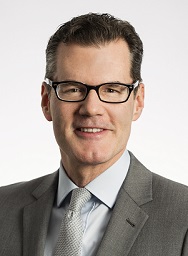New study looks at impact of a patient’s socioeconomic, racial, and ethnic background on the empathy shown by healthcare professionals
Empathy from caregivers, according to research, is a vital element of health care quality. Studies have shown that caregiver empathy – as perceived by patients – is associated with improved outcomes for patients, lower health care costs, and even less burnout among health care providers. But does a patient’s socioeconomic, racial, and ethnic background influence how empathic health care professionals are towards their patients?
This is the question researchers at Cooper University Health Care and the Center for Humanism at Cooper Medical School of Rowan University (CMSRU) examined in a new study published in PLOS ONE, a peer-reviewed open-access scientific journal published by the Public Library of Science, on March 3, 2021.

Brian W Roberts, MD
“We know that every domain in medicine is rife with health care disparities,” said Brian W. Roberts, MD, MSc, an emergency medicine physician at Cooper who served as lead author for the study. Dr. Roberts is also head of compassion research at Cooper. “At a systems level, all health care disparities – such as limited access to care – may be rooted in a lack of empathy for patients who are disadvantaged by their socioeconomic status, race, ethnicity, or all of these. But in our line of clinical research, we are asking a slightly different question: Do disadvantaged patients experience a lack of empathy at the individual, interpersonal level with their caregivers?”
The research team at Cooper conducted a meta-analysis of 18 previously published studies involving more than 9,700 patients and systematically analyzed the data to test if socioeconomic status and race/ethnicity disparities exist in patient-reported experience of clinician empathy.
The results showed that patients with low socioeconomic status did experience less empathy from clinicians than did patients with a higher socioeconomic status. Similarly, compared to white patients, empathy scores were numerically lower for patients of multiple race/ethnicity groups (Black/African American, Asian, Native American, and all non-whites combined), although none of these differences by race/ethnicity reached statistical significance.
What does this mean for patients and patient care?

Stephen W. Trzeciak, MD, MPH
“These results suggest that an ‘empathy gap’ may exist for patients with low socioeconomic status and perhaps also for some race/ethnicity groups,” said Stephen W. Trzeciak, MD, MPH, a co-author on the study and the Chief and Chair of Medicine at Cooper and CMSRU. “We are using the results of our meta-analysis to design future clinical research studies to further test for socioeconomic and race/ethnicity disparities in clinician empathy and help promote health care equity.” Dr. Trzeciak is also co-author of the book “Compassionomics: The Revolutionary Scientific Evidence That Caring Makes a Difference.”
The full research paper is available here: PLOS ONE
About the Cooper Research Institute
Through basic and clinical research, faculty at Cooper University Health Care are developing new standards of care and novel therapies to improve patient care and outcomes across numerous clinical disciplines. Cooper faculty members conduct National Institutes of Health (NIH) and industry-sponsored clinical trials each year in South Jersey, many of which are only available at Cooper.
###
Contact: Wendy A. Marano
Public Relations Manager
marano-wendy@cooperhealth.edu
Office: 856.382.6463
Cell: 856.904.1688

This study being conducted at Cooper (where my husband was a mantle cell lymphoma patient for 10 years) is vital for all it’s patients.
Empathy is fundamentally a spiritual response that underscores the dignity of each person – especially those marginalized, sick and suffering.
All the research and intellectual jargon cannot take the place of what is most needed: The Healing Aspect of Love and Mercy.
I am with you in hope, prayer and belief. Cooper is being blessed because it is cares for it’s own. Cooper is a family of which I consider myself a member.